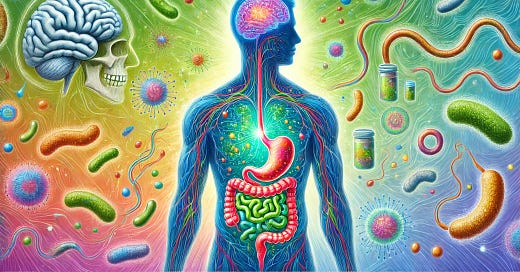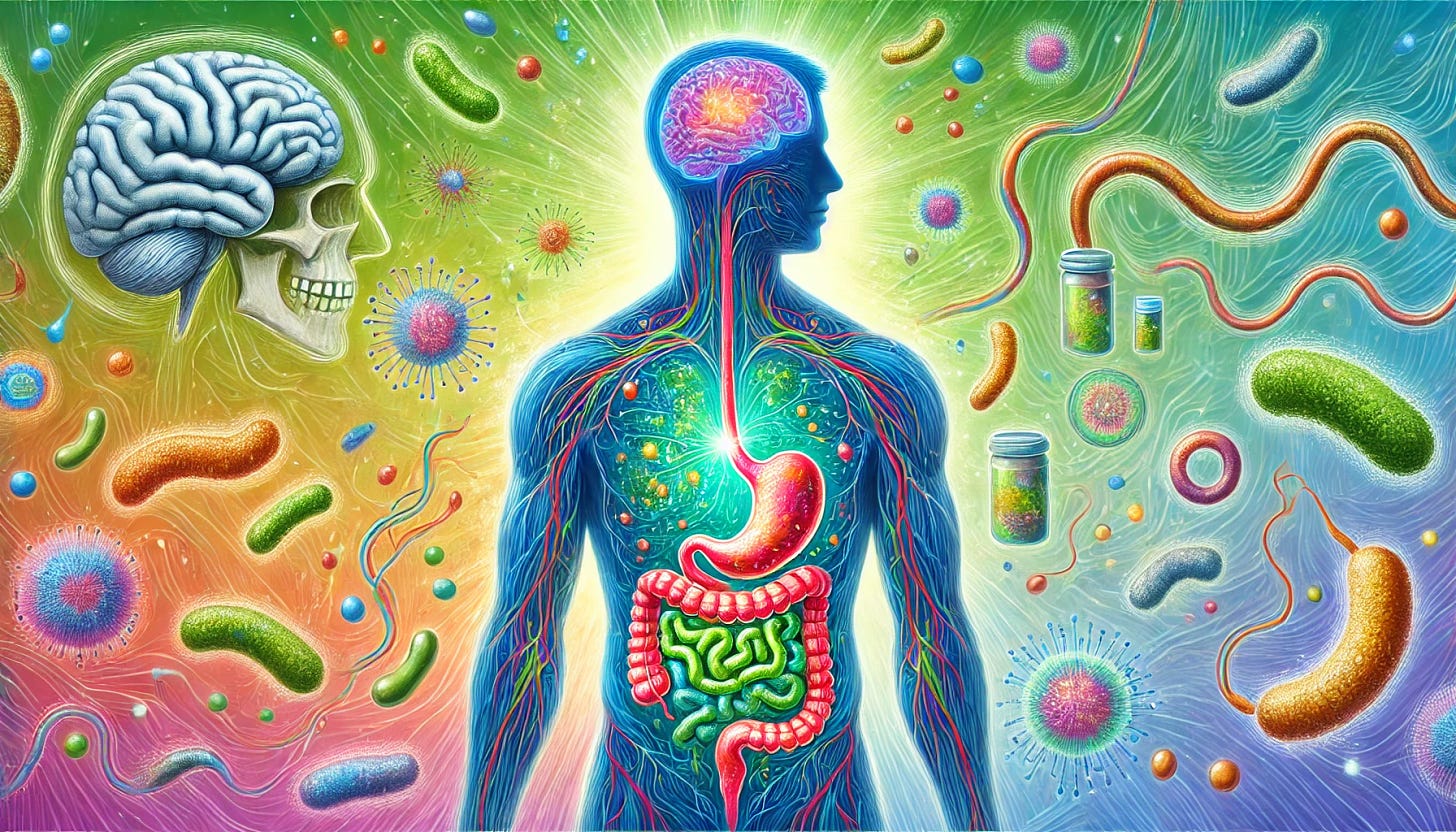Gut Feelings: How Your Microbiome Shapes Your Personality
How the trillions of microorganisms in your gut could be influencing your mood, sociability, and overall mental health.
Exploring the Connection Between Gut Flora and Personality: A Growing Body of Research
The gut microbiome's influence on health and behavior has garnered significant attention in recent years. Emerging research reveals intriguing connections between gut flora and personality traits, suggesting a complex bi-directional relationship. This article reviews the latest findings on this topic, including studies linking gut bacteria to traits like sociability and neuroticism, and explores the implications of these discoveries for understanding mental health and developing potential interventions.
Introduction
The human gut microbiome comprises trillions of microorganisms, including bacteria, viruses, fungi, and protozoa. These microorganisms play a crucial role in various bodily functions, including digestion, immune response, and even behavior. Recent studies have shed light on the microbiome-gut-brain axis, highlighting the potential impact of gut flora on personality traits and mental health. This article reviews the latest research on this connection, focusing on key studies and their implications.
Factors Influencing Gut Microbiota
Several factors influence the composition and diversity of gut microbiota:
Host Factors: Age, genetics, health status, diet, medications, gut pH, peristalsis (intestinal muscle movements), transit time, mucus secretions, and tissue oxidation-reduction potentials.
Microbial Factors: Nutrient availability, bacterial cooperation or antagonism, and bacterial adhesion to the gut lining.
External Factors: Birth method (vaginal vs. cesarean), breastfeeding vs. formula feeding, introduction of solid foods, antibiotic use, and environmental factors.
The Microbiome-Gut-Brain Axis
Sociability and Gut Bacteria
A study from Oxford University found significant correlations between specific gut bacteria and personality traits. Sociable individuals tend to have higher levels of Akkermansia, Lactococcus, and Oscillospira, while less sociable individuals have higher levels of Desulfovibrio and Sutterella. These findings suggest that social interactions may shape the microbial community in the gut, and in turn, gut bacteria can influence sociability. According to Johnson (2020), "the relationship between gut microbiome diversity and human social networks has not previously been explored but the positive relationship found here suggests that social interactions may also influence the microbiota of human societies" (p. 45).
How can I feed these gut bacteria?
Akkermansia
Luckily (maybe), this kind of bacteria eats the mucus of the lining in your intestines, so you don’t need to feed it directly. But you do want to maintain good gut lining! They might also eat polyphenol-rich foods and prebiotic fibers! Polyphenols can be found in these foods: green tea (catechin), grape seed (proanthocyanidins), and pomegranate (ellagic acid). Prebiotic fibers are nondigestible carbohydrates that make your poop bigger and softer, and gut bacteria love them. Some common prebiotic foods are garlic, apples, bananas, chicory root, onions, and Jerusalem artichokes.
Lactococcus
Fermented dairy! Yum!
Oscillospira
This one is associated with lean body mass and overall health. The exact dietary preferences of Oscillospira are not fully understood, but it is believed to thrive on complex carbohydrates and fiber, resistant starches, and plants. Eat more plants! Fruits, veggies, legumes, nuts, seeds, green bananas (I know, I know) whole grains, and maybe cooked and then cooled (and possibly re-heated) rice and potatoes.
Depression and Microbiome Diversity
Research from the HELIUS project and other studies have demonstrated that greater gut microbiome diversity is associated with lower levels of depression. Specific bacteria, such as Sellimonas and Lachnoclostridium, have been linked to depressive symptoms, suggesting that gut microbiota composition may play a role in mood regulation. A study from the University of Amsterdam found "convincing, replicable evidence for an increase in Sellimonas, Lachnoclostridium, Hungatella and a decrease in Ruminococcus, Subdoligranulum, LachnospiraceaeUCG001, Eubacterium-ventriosum and Ruminococcusgauvreauiigroup in the guts of individuals with more depressive symptoms" (Amin et al., 2022, p. 38).
Gut Microbiota in Various Childhood Disorders
Autism
Dysbiosis, or imbalance in gut microbiota, has been observed in mothers of children with autism, impacting serotonin production and potentially influencing autistic behaviors. Probiotics have shown promise in mitigating some of these effects. Saeed et al. (2022) noted, "there is growing evidence to suggest that probiotics may help in alleviating some of the gastrointestinal symptoms commonly observed in autistic children" (p. 1880).
Stunting and Obesity
Poor hygiene can lead to subclinical changes in gut microbiota, contributing to stunting in children. Similarly, the gut microbiota influences energy regulation and inflammation, affecting obesity, though evidence on the effectiveness of probiotics remains limited. Saeed et al. (2022) stated, "while probiotics show potential, there is still a lack of conclusive evidence supporting their widespread use in managing obesity-related conditions" (p. 1883).
Interaction with Other Body Systems
Immune System
The gut microbiota plays a crucial role in immune system maturation and function. Dysbiosis has been linked to autoimmune diseases, such as systemic lupus erythematosus, and can influence the development of allergic diseases and asthma. According to Clarke et al. (2020), "the role of the microbiota in immune system maturation highlights the importance of maintaining a balanced microbial community for overall health" (p. 45).
Kidney-Gut-Microbiota Axis
Gut microbiota also interacts with the kidneys, influencing conditions like hypertension and chronic kidney disease. Short-chain fatty acids (SCFAs), produced by gut bacteria, can affect immune responses and kidney health. Saeed et al. (2022) explain, "the gut-kidney axis plays a significant role in maintaining homeostasis, and disruptions in this axis can lead to various health complications" (p. 1885).
Dysbiosis and Disease
Dysbiosis is a common feature in various diseases beyond the gastrointestinal tract, including neurodevelopmental disorders (e.g., autism, ADHD), respiratory disorders (e.g., asthma, allergies), and metabolic disorders (e.g., obesity, diabetes). Understanding these connections can inform new approaches to treatment and prevention. Clarke et al. (2020) noted, "the implications of dysbiosis extend far beyond the gut, affecting multiple organ systems and contributing to the pathogenesis of numerous diseases" (p. 48).
Potential Benefits and Risks of Probiotics
While probiotics hold potential in managing gut microbiota-related conditions, more research is needed to establish their efficacy and safety. Personalized benefit-risk assessments are crucial, especially in conditions like Helicobacter pylori infection, where eradication strategies must be carefully considered. Camilleri et al. (2021) argue, "the decision to eradicate H. pylori should be based on individual benefit-risk assessments rather than unconditional recommendations" (p. 90).
Conclusion
The growing body of research underscores the intricate relationship between the gut microbiome and personality traits. While much remains to be understood, these findings open new avenues for exploring how modifying gut microbiota could impact mental health and behavior. Continued research and personalized approaches will be essential in harnessing the potential of the microbiome-gut-brain axis for therapeutic purposes. As Winter and Baumler (2015) succinctly put it, "the interplay between microbiota, pathogens, and inflammation is complex and requires a nuanced understanding to develop effective treatments" (p. 150).
Biggest Takeaway?
Eat more veggies. I hear the current recommendation is to try to get to 30 different plants a week. That sounds like a lot, but don’t overthink it! Blend up fruit and veggie smoothies, chop up leafy greens and dump them in your pasta, grab a bag of baby carrots and have them front and center in your fridge to snack on. Skip the pre-made bread (Whole grains! Seeds! it promises) and get a tub of oatmeal. Microwave it in a mug, chuck in leftover fruit. The key here is that you have to make it a point to feed your guts a variety, and keep at it for weeks and weeks while your gut flora slowly grows. I absolutely believe you can do it! Who doesn’t want better poops, better mental health, and healthier kids??
References
Johnson, K. V.-A. (2020). Gut microbiome composition and diversity are related to human personality traits. Human Microbiome Journal, 15, Article 100069. [Link](https://www.sciencedirect.com/science/article/pii/S2452231719300269)
Haridy, R. (2020). Oxford study explores links between personality and the gut microbiome. New Atlas. [Link](https://newatlas.com/health-wellbeing/oxford-study-personality-gut-microbiome/)
Bastiaanssen, T. F. S., et al. (2020). Gutted! Unraveling the role of the microbiome in major depressive disorder. Harvard Review of Psychiatry, 28(1), 26–39. [Link](https://doi.org/10.1097/HRP.0000000000000243)
Haridy, R. (2022). Two studies deliver strong evidence linking depression and gut bacteria. New Atlas. [Link](https://newatlas.com/health-wellbeing/depression-gut-bacteria-strong-evidence/)
Saeed, N. K., Al-Beltagi, M., Bediwy, A. S., El-Sawaf, Y., & Toema, O. (2022). Gut microbiota in various childhood disorders: Implication and indications. World Journal of Gastroenterology, 28(18), 1875-1901. [Link](https://www.ncbi.nlm.nih.gov/pmc/articles/PMC9150060/)
Clarke, G., Cryan, J. F., Dinan, T. G., & Bastiaanssen, T. F. S. (2020). Childhood development and the microbiome: The intestinal microbiota in maintenance of health and development of disease during childhood development. PubMed. [Link](https://pubmed.ncbi.nlm.nih.gov/33307032/)
Camilleri, M., Tack, J., & Vanner, S. (2021). Gut microbiota: The missing link between Helicobacter pylori infection and metabolic disorders? PubMed. [Link](https://pubmed.ncbi.nlm.nih.gov/34220702/)
Houghton, L. A., & Heitkemper, M. (2022). Gastrointestinal microbiome and Helicobacter pylori: Eradicate, leave it as it is, or take a personalized benefit-risk approach? PubMed. [Link](https://pubmed.ncbi.nlm.nih.gov/35317277/)
Winter, S. E., & Baumler, A. J. (2015). The roles of inflammation, nutrient availability, and the commensal microbiota in enteric pathogen infection. PubMed. [Link](https://pubmed.ncbi.nlm.nih.gov/26185088/)




